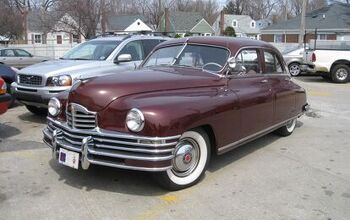Quote Of The Day: Ask The Man Who Owns One Edition
Felix Kramer, an entrepreneur and plug-in car activist, is almost certainly the first person in the world to own both a Nissan Leaf and a Chevrolet Volt… which, at least in theory, makes him the perfect person to compare the real-world ownership experiences of these two highly-hyped vehicles ( and once again prove the uselessness of “automotive journalism”). Though he demurs that he “hasn’t had much chance to really compare them,” he tells The Solar Home and Business Journal that
It’s quite obvious to me that for two-car families, it’s no problem in any way for the second vehicle to be an all-electric because that’s the car used for local driving. There’s an enormous market of tens of millions for all-electric vehicles despite Americans’ so-called range anxiety.
Cars are sold as giving you freedom. People go into a dealer and say about an all-electric car, “Oh, I have to plug it in. What if I want to drive it across the country someday? I won’t buy this car.” That mentality is very deeply seated, and that’s part of the reason that the plug-in hybrids could be the primary platform for plug-in vehicles for the next decade or two.
In the meantime, people who get a plug-in hybrid as their second vehicle may find themselves asking, “Why did I pay for this engine, I’m just driving it electrically.” In our family, the Leaf will be the car my wife and I will pick first every day when we’re in the Bay Area. When we’re both driving or we want to travel beyond the range of the Leaf, we’ll take the Volt.
And this, straight from the horses mouth, is why we’ve been bearish on the Volt: if you want an EV, chances are you can afford another car that will get better long-distance efficiency than a Volt. After all, the farther you drive the Volt, the worse its efficiency becomes until it reaches an unimpressive ~35 MPG or thereabouts. A Leaf for commuting and (say) a Prius for long distances would be considerably cheaper and, depending on the lengths of the long-distance trips, more efficient. As a fan of plug-ins, Kramer is clearly geeked about his Volt, but it seems clear that the inherent compromise of the EREV drivetrain concept keep it from mastering either zero-emissions commuting or efficient long-distance cruising. Jack of all trades, as the saying goes, master of none.
More by Edward Niedermeyer
Latest Car Reviews
Read moreLatest Product Reviews
Read moreRecent Comments
- Jalop1991 This is easy. The CX-5 is gawdawful uncomfortable.
- Aaron This is literally my junkyard for my 2001 Chevy Tracker, 1998 Volvo S70, and 2002 Toyota Camry. Glad you could visit!
- Lou_BC Let me see. Humans are fallible. They can be very greedy. Politicians sell to the highest bidder. What could go wrong?
- SPPPP Vibrant color 9 times out of 10 for me. There may be a few shapes that look just right in metallic gray, for example. There are a few nices ones out there. And I like VW "White Silver". But I'd usually prefer a deep red or a vibrant metallic green. Or a bright blue.
- 28-Cars-Later Say it ain't so, so reboot #6* isn't going to change anything?[list=1][*]V4-6-8 and High "Tech" 4100.[/*][*]Front wheel drive sooooo modern.[/*][*]NOrthSTARt.[/*][*]Catera wooooo.[/*][*]ATS all the things.[/*][*]We're *are* your daddy's Tesla. [/*][/list=1]


































Comments
Join the conversation
Of course our author lives in California, a mild climate ideal for EVs. But what he does kinda makes sense (if one disregards the horrible economics). In any two-car family, there is probably at least one person (and maybe two) who follows a very predictable M-F use pattern of driving to work, parking at work and driving home in the evening. Assuming all that's within the EV's range (and assuming he has the necessary juice to fully charge the battery overnight), the EV makes some sense. What makes less sense is the Volt as the second car. As a gasoline car, the Volt is not too great . . . a Prius would be much better as well as cheaper to buy. And, with it's limited electric range, using the Volt as an EV doesn't save that much money, compared to a thrifty gasoline vehicle or a Prius-type hybrid. OTOH, as the only family car, the Volt makes some sense if the majority of use is going to be within it's EV range.